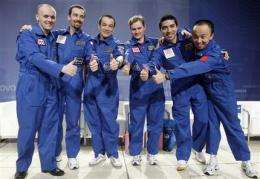Crew of mock Mars mission appear healthy, joyful

Staying inside cramped, windowless modules for nearly a year-and-half was a tough challenge for an international crew of six researchers simulating a mission to Mars under 24-hour surveillance by scientists.
They said Tuesday they coped with the fatigue and stress of isolation with simple methods: doing exercises, reading books, trying to learn foreign languages - but above all keeping themselves busy with their work.
The crew of three Russians, a Frenchman, an Italian-Colombian and a Chinese appeared energetic and joyful at their first news conference after leaving their claustrophobic quarters last Friday.
"I wanted to take part in an interesting adventure and also do something useful for humankind, and I now feel happy that I have succeeded," said Russian team leader Alexey Sitev.
He said there were no conflicts among the crew thanks to thorough preparations and training.
"I actually thought that it would be harder and more stressful for me, and I was surprised how smoothly it went," said Sitev, a blue-eyed, soft-spoken former navy diver.
Sitev, who got married just a few weeks before the start of the mission, said his wife stoically accepted his absence.
"She would have liked for me to stay home of course, but she trusted me and felt that she had to cope with it since it was necessary for me to take part," he said.
Scientists said that long confinement without daylight and fresh air put team members under stress as they grew increasingly tired of one another's company. They warned that isolation challenges are actually stronger on a simulated mission because of the lack of euphoria and risk of a real space flight.
"A key thing that we can't simulate is the feeling of danger," said the mission chief, cosmonaut Boris Morukov. "They were always aware of us following them from behind the wall."
He said the second half of the mission was the most difficult, as the initial challenges of learning to deal with scientific equipment were behind them and the daily routine grew increasingly monotonous.
Morukov said each crew member will be paid about $100,000 for the mission.
Along with more than 100 scientific experiments that kept them busy most of the day, crewmembers watched movies, played computer games and celebrated holidays together.
"This mission was a success and so we can go forward and now plan to go to Mars and move confidently," said Frenchman Romain Charles.
Italian-Colombian Diego Urbina said social networks helped ease the pressure. "You get the feedback, like all the kids that want to go to Mars, and they tell you so many nice things, many things about their own dreams, and that gives you a lot of impulse to go on," he said.
©2011 The Associated Press. All rights reserved. This material may not be published, broadcast, rewritten or redistributed.





















